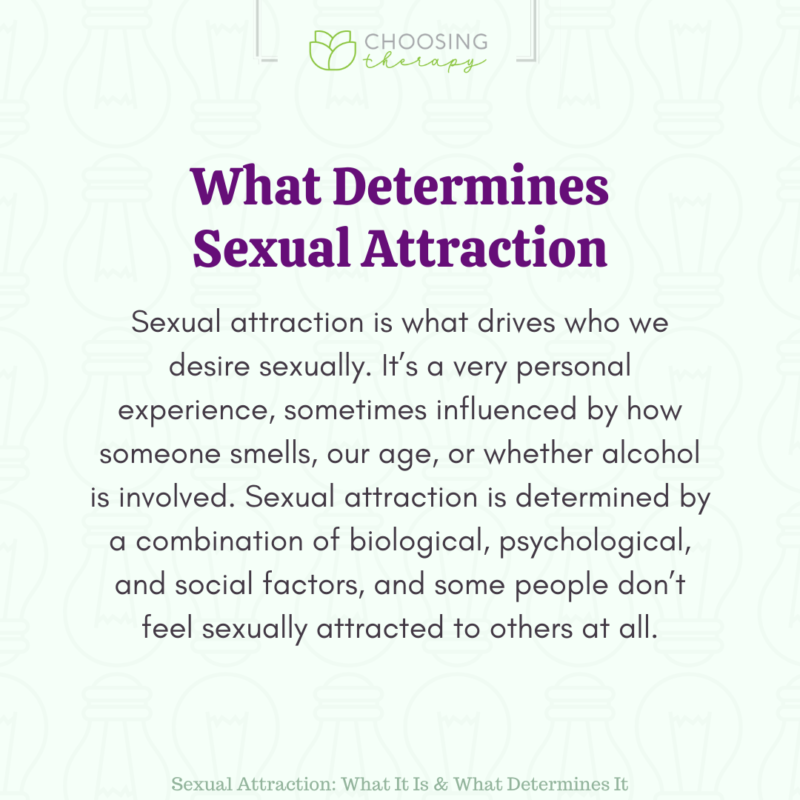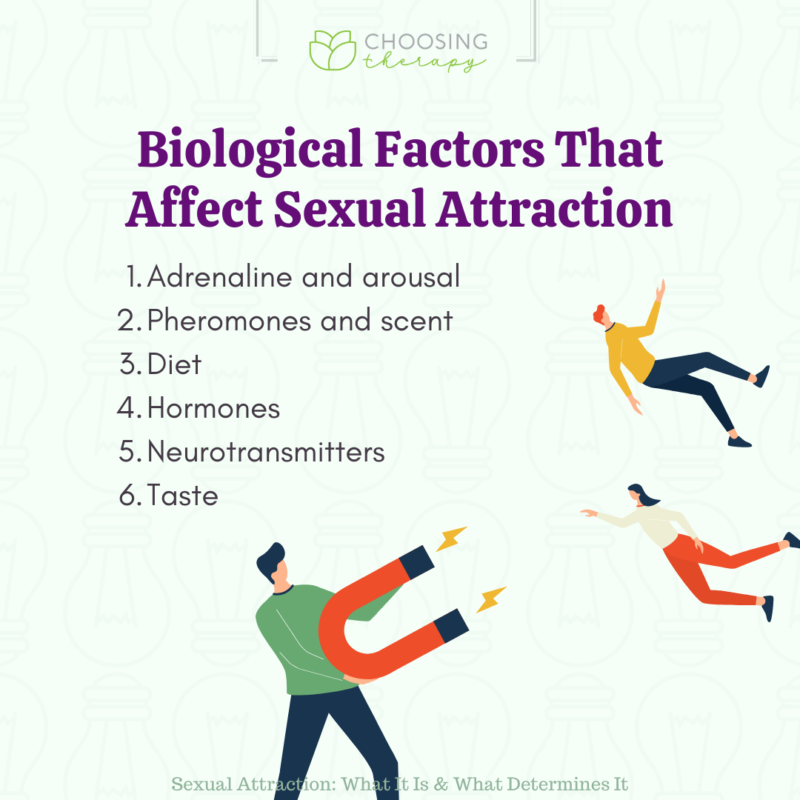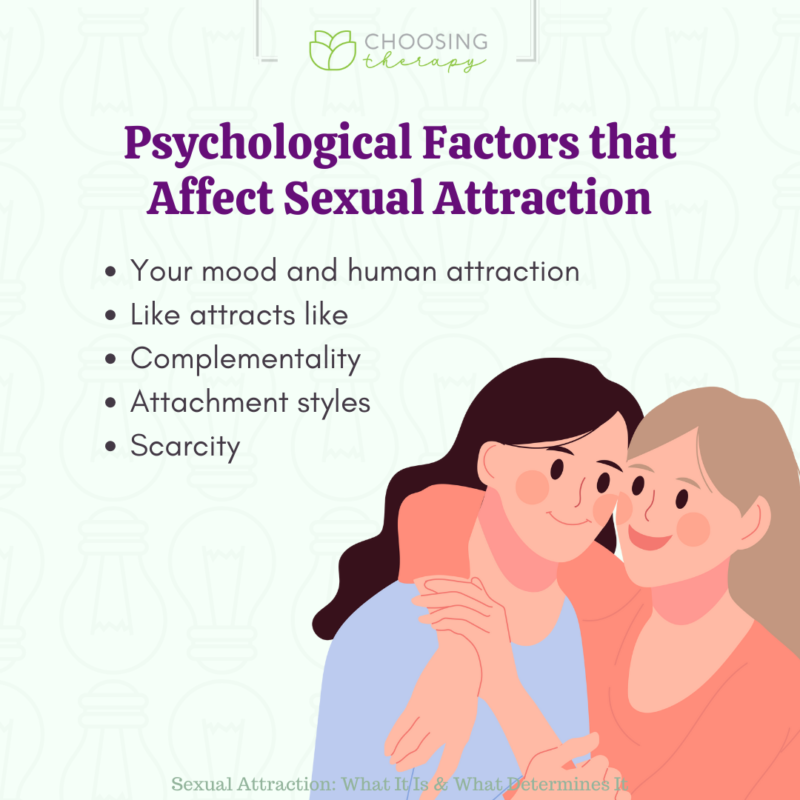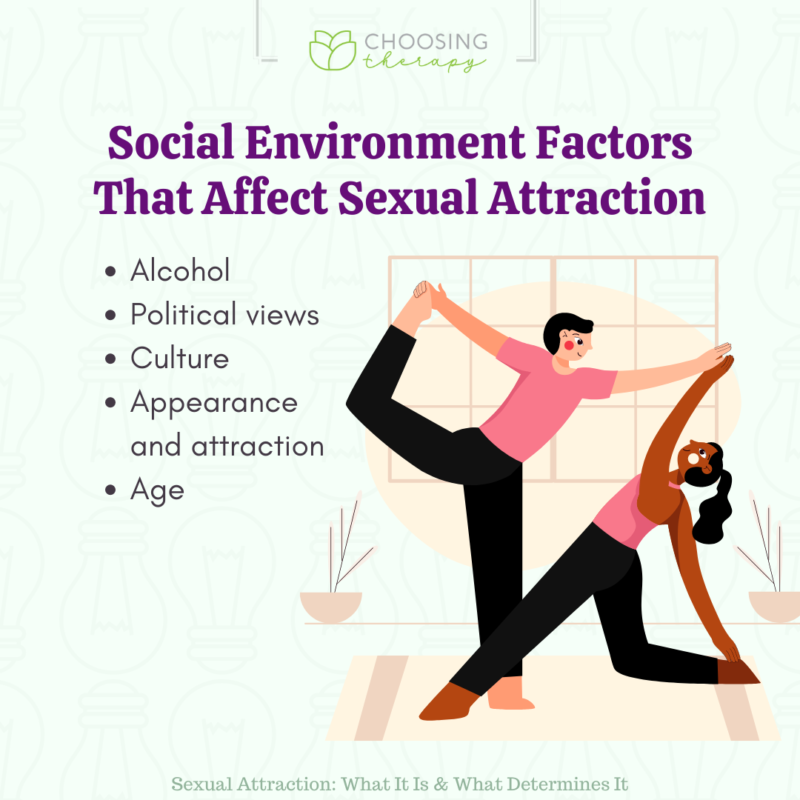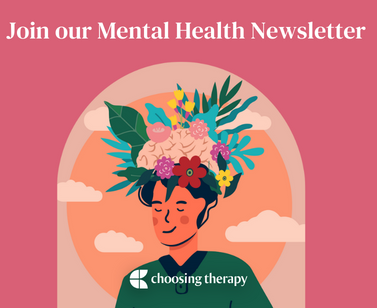Sexual attraction is what drives who we desire sexually. It’s a very personal experience, sometimes influenced by how someone smells, our age, or whether alcohol is involved. Sexual attraction is determined by a combination of biological, psychological, and social factors, and some people don’t feel sexually attracted to others at all.
What Is Sexual Attraction?
Sexual attraction is one of the many types of attractions. To start, here’s a more formal definition of sexual attraction; “attraction that makes people desire sexual contact or shows sexual interest in another person(s).”1 Sexual attraction fuels your sexual orientation. But, what drives sexual attraction or what makes you more likely to be sexually attracted to someone? This is where things get a bit more complicated, but we can look at sexual attraction being driven by three different factors: biological, psychological, and social. Sexual attraction can be fluid and who you are attracted to can change over time, making it even more complex.
Biological Factors That Affect Sexual Attraction
Biological factors are often the first thing that come to mind when people think about who they are attracted to. This is so common, the term “primary attraction” has been used to describe it, which is “attraction to people based on first impressions, such as appearance or how they smell.”2 But, there are some other biological factors that can impact sexual attraction beyond the first impression.
Adrenaline & Arousal
If you’re already excited or pumped up from adrenaline, you are more likely to be attracted to someone you meet. One of the most famous studies of biological factors affecting sexual attraction had two groups contacted by an attractive interviewer who then gave them a questionnaire. One group was on a suspension bridge that caused fear. The other group was on a bridge that did not cause fear. They discovered that those who were on the fear-arousing suspension bridge were more likely to try contacting the interviewer after the experiment, and also to put down sexual content/imagery on the questionnaire than the group on the non-fear causing bridge.3 This phenomenon is most commonly referred to as “misattribution of arousal”, which is when individuals make a mistake about what they think caused them to feel aroused. In this case, participants misattributed their adrenaline on the bridge as heightened attraction to the interviewer.
In another study, individuals were approached before or after riding a roller coaster and were shown a photograph of an individual. They were then asked to rate the individual on “attractiveness and dating desirability.”4 They found ratings to be higher amongst those who had just gotten off the roller coaster. This confirmed the study’s predictions that emotional responses can be intensified (attraction to someone) by arousal from something else (roller coaster adrenaline), even if they aren’t related.
Pheromones & Scent
How someone smells can also cause physical attraction. Many people assume smell means if someone has showered or wears perfume or cologne. While these things can impact if someone is attracted to someone else, and you may prefer a certain scent over another, your natural scent can also play a role.
All bodies produce pheromones. These can be seen as messengers that deliver information about sexual arousal, desire, hormone levels, and even fertility when they are released through sweat, saliva, or urine. While they don’t have a specific smell we can identify, our bodies still pick up on these scents and they influence our behavior. Some people naturally produce more pheromones than others, and research has found those who have elevated pheromone levels have more sex, feel more confident, and bond more with others.
Diet
It’s no mystery what we eat impacts our bodies, and many people agree that what you eat can impact how you smell. Some research has found what you eat can also impact your pheromones. While there’s no “miracle food” that will make you more sexually attractive, and there are limitations surrounding diet and pheromones in humans, some research has found eating a healthy and well balanced diet can have a positive impact and increase pheromones, thus increasing your desirability to others.
Hormones
Hormones are most commonly associated with puberty, but can also impact sexual attraction. For example, lower levels of testosterone often decreases libido and, as a result, individuals may feel less sexual attraction or arousal. Other hormones, like oxytocin, can also play a role in sexual attraction. There’s a common myth that not all individuals produce oxytocin; however, oxytocin is produced by all bodies and plays an important role in how we bond with one another.
Neurotransmitters
Dopamine and serotonin are commonly referred to as “happy chemicals”. While these don’t specifically make you attracted to others, they can still play a role in sexual attraction. When you’re attracted to someone your serotonin levels increase and your brain also releases dopamine. All this results in increased positive emotion and sometimes a sense of elation. People who have lower levels of dopamine and serotonin may experience decreased libido and sexual attraction to others, but this is going to be unique to each individual.
Taste
Since taste and smell go hand in hand, it comes as no surprise taste can also impact sexual attraction. While research on this is less prevalent, we do know pheromones are secreted through saliva. Meaning, when you kiss an individual your body will react to the pheromones in their saliva and vice versa. Our five senses are also constantly used to gather information about the world around us. If a certain taste is off-putting to you, this being present when you are with someone will likely impact your attraction. For example: someone who tastes of alcohol or cigarettes may be less sexually desirable to you than someone who tastes of mint.
Top Rated Online Therapy Services BetterHelp – Best Overall “BetterHelp is an online therapy platform that quickly connects you with a licensed counselor or therapist and earned 4 out of 5 stars.” Visit BetterHelp Talkspace – Online Counseling For the LGBTQIA+ Community See a licensed therapist who sees you! Covered by most insurance plans. Visit Talkspace
Psychological Factors That Affect Sexual Attraction
Psychological factors can also impact who you are, or aren’t, sexually attracted to. So your mood, similarities, availability of partners, and even differences can all play a role.
Mood & Human Attraction
Research has found those who are experiencing elevated mood, or just received positive news, are more likely to be interested in the next person they meet. The more you are interested or like a person, the more likely you are to develop an attraction to them. Also, when you are in a more positive mood, you will probably be more interested in talking to someone, may be more engaged in the meeting, and have more positive memories associated with the meeting and/or person.
Like Attracts Like
Research finds we are often attracted to those who are similar to us. Some scientists refer to this as “assortative mating”. For example, tall people dating other tall people.5 But why? For one, being around those who are similar to us is often comforting, predictable, and validating. Many people also want to be involved with those who have similar attitudes, enjoy the same activities, and have similar backgrounds. Research also shows we often favor those who belong to the same group we do, commonly referred to as “ingroup bias.”6
Complementarity
While similarity is important, complementary characteristics have often been found to be equally as important.7 While this may sound very similar, when we talk about complementarity it means two characteristics support one another. For example: an introverted person who is with an extroverted individual, or someone who is more hyper and another who is relaxed. Many might say this supports the saying “opposites attract” and there is some truth to this. But, it should be, opposite complementary personalities attract. You’re more likely to be attracted to someone who is similar to you in values and qualities, but complimentary to you in characteristics.
Attachment Styles
Attachment can be defined as the way we relate to others in intimate relationships. Attachment styles play a role in how we interact and behave in relationships, from childhood through adulthood. Dr. Patrick Wanis summarizes the impact of attachment on relationships by stating “we become attracted to people who reflect and repeat the type of relationship we had with our primary attachment figure.”7 All this to say, we are likely going to be sexually attracted to those who are similar to those we have had other relationships with. This is why so many individuals find they are sexually attracted to the same type of people or even date the same type of individuals over and over again.
Scarcity
The scarcity principle is a psychological concept often used by businesses.8 For example: saying there are only two items left in stock increases the likelihood someone is going to buy the product out of fear the item will run out, or is in high demand. The scarcity principle can also apply to relationships. Research has found if you’re in a bar and all of a sudden it is getting ready to close, your options for having someone to take home start to become less available. With these fewer options you start to wonder which will be available and are more likely to select an option.9 This behavior has also been observed outside of bars. The fewer options for sexual relationships there are, the more likely people are to choose an option, even if it is one they would not normally choose.
Being true to oneself requires self-understanding and emotional strength. A therapist can help support your journey. BetterHelp has over 20,000 licensed therapists who provide convenient and affordable online therapy. BetterHelp starts at $65 per week. Take a Free Online Assessment and get matched with the right therapist for you.
Social Environment Factors That Affect Sexual Attraction
So far we’ve talked about biological and psychological factors that impact your attraction. Now we will look at social and environmental factors that can impact who you might be sexually attracted to such as alcohol, culture, and even age.
Alcohol
The term “beer goggles” has more truth to it than you may think. Alcohol lowers inhibition and also aids people in relaxing. The combination has a significant impact on sexual attraction and sexual behavior. Research completed on alcohol and sexual attraction has repeatedly shown alcohol heightens a person’s likelihood they will be sexually attracted to another individual. With “liquid courage”, individuals are also more likely to take risks and to make sexual advances than when they are sober.
Political Views
Political views are also a driving factor for sexual attraction. A 2018 study found 70% of households had couples of the same political affiliation, with only 30% having a mismatch. When there was a mismatch it was often those with party affiliations (eg. democrat or republican) and those of independent affiliation.10 This can tie back to the point above about similarities. For many, finding that someone holds different beliefs can be a turn-off and lead to increased disagreements or arguments.
Culture
Cultural factors are also involved in sexual attraction. In Western societies, thinness tends to be more preferred, expected, and deemed desirable; however, in other cultures this is not the case. Research completed on waist-to-hip-ratio has found western cultures idealize a lower ratio, whereas other cultures idealize a larger ratio. Outside physical features, other cultural factors can impact sexual attraction such as religious views and expectations, as well as attitudes towards sexual behaviors and relationships. For example, some cultures and religions value modesty and sexualization is discouraged.
Appearance & Attraction
For some, looking “fit” and “healthy” is associated with sexual attractiveness. While physical fitness, appearance, and health are not always correlated, many still use this as a gauge.11 Not to mention research has found bias surrounding how attractive individuals appear and what qualities they are assumed to have. For example: those who are deemed attractive are often seen as having positive qualities, whereas those who are deemed less attractive are often seen as having negative qualities.
Age
Age is three fold. On the one hand, how old someone looks (or does not look) can impact their sexual attractiveness to others. Research has found the following key points: older faces are found less attractive than younger faces12 and age affects female attractiveness more negatively than males.13 On the other hand, age also plays a role in an individual’s desire for sexual attraction. As some individuals age they are less sexually attracted to others while it stays the same for other people, and for some, their level of sexual attraction may even increase with age. Finally, how sexually attractive someone feels can also vary with age. Some people feel less desirable, while others feel more confident as they age. Overall, how someone feels is going to be unique to them.
Final Thoughts
Sexual attraction is impacted by a variety of factors, from smell and adrenaline, to alcohol and age. You may question your sexuality from time to time, struggle with your sexual identity, or even spend time exploring your sexuality. It’s also important to remember some asexual folks don’t feel sexually attracted to others, and may instead, desire other types of relationships. Neither is right or wrong, but if you need someone to talk to, there are many online therapy options including LGBTQ+ online therapy to help you understand your sexual attraction.
To help our readers take the next step in their mental health journey, Choosing Therapy has partnered with leaders in mental health and wellness. Choosing Therapy is compensated for marketing by the companies included below. Online Therapy BetterHelp Get support and guidance from a licensed therapist. BetterHelp has over 20,000 therapists, who provide convenient and affordable online therapy. Complete a brief questionnaire and get matched with the right therapist for you. Get Started Psychiatry, with you in mind Talkiatry Our Psychiatrists Can Diagnose Your Condition, Prescribe Medication, And Monitor Your Progress. Most psychiatry visits cost patients $30 or less* Free Assessment Drinking Moderation Sunnyside Want to drink less? Sunnyside helps you ease into mindful drinking at your own pace. Think lifestyle change, not a fad diet. Develop new daily routines, so you maintain your new habits for life. Take a 3 Minute Quiz Relationship Help OurRelationship (Free Couples Course) OurRelationship has been proven to help couples improve communication, intimacy, and trust. 94% would recommend it to a friend. Get Started Mental Health Support Group App Circles Anytime, anonymous, and free. Never feel alone during life’s greatest challenges. Drop-in to live conversations and share thoughts, ask questions, or learn from others on the same journey. Join Circles Now Mental Health Newsletter A free newsletter from Choosing Therapy for those interested in mental health, therapy and fighting stigma. Sent twice weekly. Sign Up Choosing Therapy Directory You can search for therapists by specialty, experience, insurance or price, and location. Find a therapist today. *Includes all types of patient cost: copayment, deductible, and coinsurance. Excludes no shows and includes $0 Visits.Additional Resources
Online Anxiety Test A few questions from Talkiatry can help you understand your symptoms and give you a recommendation for what to do next. How Does ERP Help With Intrusive Thoughts? Obsessive compulsive disorder (OCD) is a psychiatric condition marked by the presence of obsessive thoughts, images, doubts, or urges, followed by compulsive behaviors or acts aimed at easing the distress caused by the obsession. While the content of the obsessions can take many forms, they are always repetitive, persistent, involuntary, and intrusive, and they often result in a great deal of anxiety for the person experiencing them.





